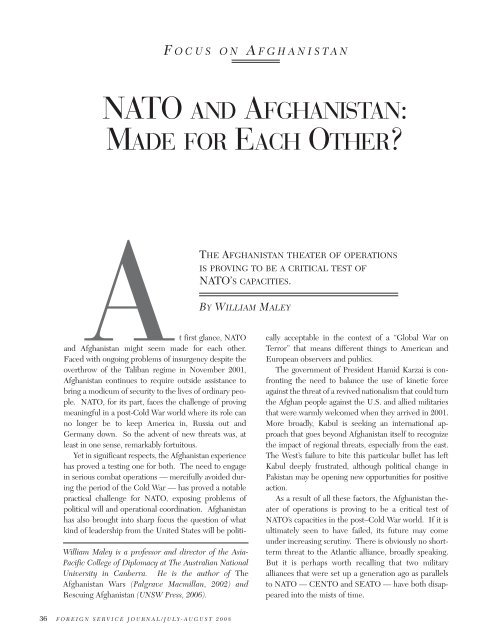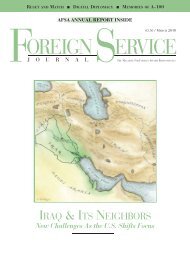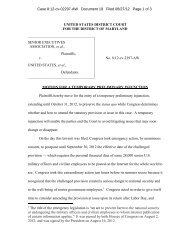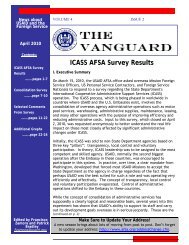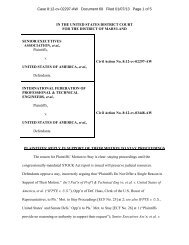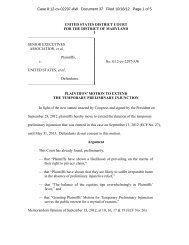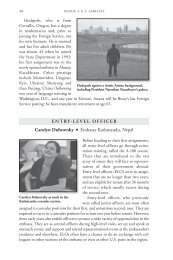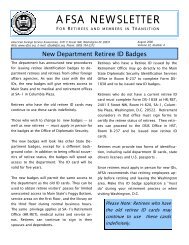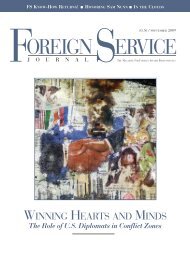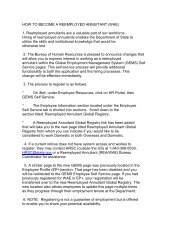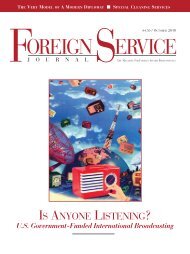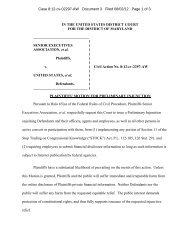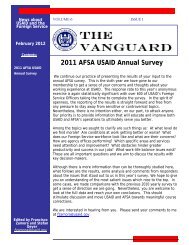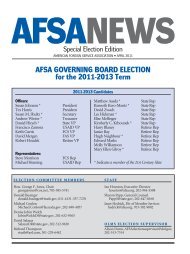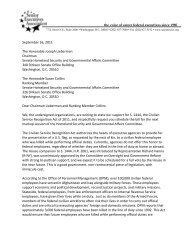F OCUS - American Foreign Service Association
F OCUS - American Foreign Service Association
F OCUS - American Foreign Service Association
Create successful ePaper yourself
Turn your PDF publications into a flip-book with our unique Google optimized e-Paper software.
36 FOREIGN SERVICE JOURNAL/JULY-AUGUST 2008<br />
F <strong>OCUS</strong> ON A FGHANISTAN<br />
NATO AND AFGHANISTAN:<br />
MADE FOR EACH OTHER?<br />
At first glance, NATO<br />
and Afghanistan might seem made for each other.<br />
Faced with ongoing problems of insurgency despite the<br />
overthrow of the Taliban regime in November 2001,<br />
Afghanistan continues to require outside assistance to<br />
bring a modicum of security to the lives of ordinary people.<br />
NATO, for its part, faces the challenge of proving<br />
meaningful in a post-Cold War world where its role can<br />
no longer be to keep America in, Russia out and<br />
Germany down. So the advent of new threats was, at<br />
least in one sense, remarkably fortuitous.<br />
Yet in significant respects, the Afghanistan experience<br />
has proved a testing one for both. The need to engage<br />
in serious combat operations — mercifully avoided during<br />
the period of the Cold War — has proved a notable<br />
practical challenge for NATO, exposing problems of<br />
political will and operational coordination. Afghanistan<br />
has also brought into sharp focus the question of what<br />
kind of leadership from the United States will be politi-<br />
THE AFGHANISTAN THEATER OF OPERATIONS<br />
IS PROVING TO BE A CRITICAL TEST OF<br />
NATO’S CAPACITIES.<br />
BY WILLIAM MALEY<br />
William Maley is a professor and director of the Asia-<br />
Pacific College of Diplomacy at The Australian National<br />
University in Canberra. He is the author of The<br />
Afghanistan Wars (Palgrave Macmillan, 2002) and<br />
Rescuing Afghanistan (UNSW Press, 2006).<br />
cally acceptable in the context of a “Global War on<br />
Terror” that means different things to <strong>American</strong> and<br />
European observers and publics.<br />
The government of President Hamid Karzai is confronting<br />
the need to balance the use of kinetic force<br />
against the threat of a revived nationalism that could turn<br />
the Afghan people against the U.S. and allied militaries<br />
that were warmly welcomed when they arrived in 2001.<br />
More broadly, Kabul is seeking an international approach<br />
that goes beyond Afghanistan itself to recognize<br />
the impact of regional threats, especially from the east.<br />
The West’s failure to bite this particular bullet has left<br />
Kabul deeply frustrated, although political change in<br />
Pakistan may be opening new opportunities for positive<br />
action.<br />
As a result of all these factors, the Afghanistan theater<br />
of operations is proving to be a critical test of<br />
NATO’s capacities in the post–Cold War world. If it is<br />
ultimately seen to have failed, its future may come<br />
under increasing scrutiny. There is obviously no shortterm<br />
threat to the Atlantic alliance, broadly speaking.<br />
But it is perhaps worth recalling that two military<br />
alliances that were set up a generation ago as parallels<br />
to NATO — CENTO and SEATO — have both disappeared<br />
into the mists of time.


